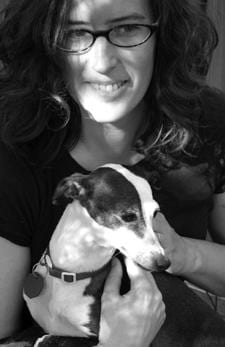Montreal-based writer Nairne Holtz has been on a wild ride for the last few years. She received critical praise for her debut novel, The Skin Beneath, and was shortlisted for a Lambda Literary Award for an anthology she co-edited, No Margins: Writing Canadian Fiction in Lesbian. Add that to a host of published short stories and she’s a writer in demand.
“By the end of October I’ll have done 18 readings in 18 months in 12 different cities,” says Holtz. “I mostly just want a break and to crawl back into my writing cave.”
Before hitting the cave, she’ll drop by Library and Archives Canada to read at Transgress, an evening of queer writing that’s part of the Ottawa International Writers’ Festival. Having attended Transgress as an audience member two years ago, Holtz is thrilled to have the chance to take the stage in an event that aims to push the boundaries.
“I think that transgressive writing ideally is something that scares people, makes them think and is provocative,” says Holtz. “Two of the most transgressive books I can think of would be Jane Delynn’s novel Leash and Heather Lewis’ House Rules, which both address the question what is the nature of consent and what can a person give consent to, and they are very disturbing.”
Asked about the role transgressive literature plays these days, Holtz first muses about a societal shift in Canada that has altered the landscape for queer communities. She remembers coming out in the politically charged early 1990s, when the focus was on building a queer nation and challenging set beliefs about sexuality. Holtz observes that, in Canada at least, the tone has changed radically in gay and lesbian circles, with much less emphasis now on embracing difference and more on integration. But she doesn’t waste time pining for days gone by. Instead, she prefers to ponder the new possibilities the changing winds may open up.
“I wonder to what extent our alliances will be based more on sensibility and to what extent you embrace mainstream values or don’t — and will transgression be irrelevant to some people who are gay, lesbian, bi and transsexual? And might people who want to embrace transgression find that they have more in common with some straight people?”
Like any good writer, Holtz explores new possibilities in her fiction. She says that when she was invited to Transgress she knew immediately what story she would read. “My story is actually about an amputee fetishist who’s a heterosexual man,” she laughs.
Holtz is well versed in the world of queer publishing. Although much of her former life as a librarian was spent in law libraries, she was also instrumental in building up the lesbian fiction collection for the University of Western Ontario’s Pride Library. In addition, she’s developed a comprehensive Bibliography of Canadian Literature with Lesbian Content, available online. One thing that perplexes her is the way most Canadian writers deal with questions of sex and sexuality.
“I think a lot of literary writers are terrified about writing about sexuality, ” says Holtz. “People are so coy about sex. Straight people, gay people, everybody — and I just think, ‘Why?’ Canadians, and I don’t mean just lesbians, but all Canadians are just a little scared that if they write about sex they won’t be taken seriously.”
Although Holtz defines herself primarily as an author of literary fiction, she hasn’t shied away from writing about sex. In fact, she notes that when she started publishing her work, erotica anthologies were one of the few spaces where one could publish lesbian writing at all, so she sent in stories. Holtz also says that writing about sex gives her access to a powerful tool.
“It gives you this opportunity to reveal so much about your characters,” she says.
As for current projects, Holtz says she’s starting a new novel, but has also just finished a collection of shorter pieces entitled This One’s Going to Last to Forever.
“It’s mostly about relationships that are destined to fail,” she says. “It’s kind of about fucked up people, but it’s black comedy, and it’s going to be a hard sell, because presses hate short story collections and novellas, and it’s black comedy, it’s queer, and there’s lots of sex.”

 Why you can trust Xtra
Why you can trust Xtra


